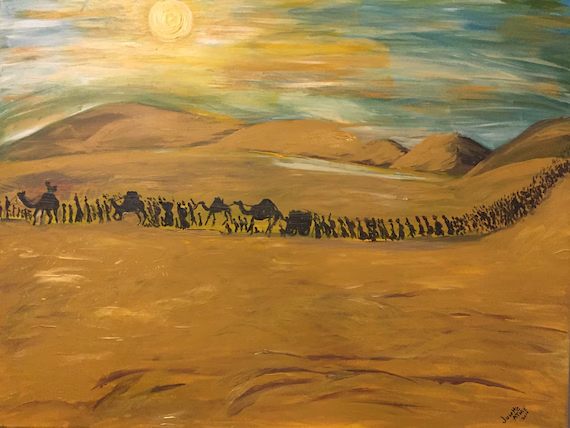The Story of Daniel
Daniel was one of the many Israelites who were captured by King Nebuchadnezzar's army and taken from Jerusalem to the far-off city of Babylon.
There, together with other good-looking, intelligent boys from some of the best families, he was selected for special training.
King Nebuchadnezzar ordered that the boys should be well taken care of, taught the Babylonians' language, study their writings, and learn from their wisest men. He had food sent to them from his own kitchens.
Daniel and three of his friends, Shadrach, Meshach and Abednego, wanted to keep God's laws about what they should eat, so they refused to eat the King's food.
'Let us eat only vegetables and drink water. Daniel said to the court official in charge of them.
'My life will be in danger if you get thinner than the other boys, or get ill, said the official, who had grown fond of Daniel.
'But you may try it for ten days.
After the ten days. Daniel and his friends were in better health than the other boys, and they were very good at their lessons, so they were allowed to eat their own food.
The years passed, and Daniel grew as knowledgeable and wise as the wise men in Babylon. He was also good at understanding what dreams meant.
The King was so pleased with Daniel and his friends, that he made them officials in his court.
One night. King Nebuchadnezzar had a frightening dream which terrified him. In the morning, he sent for all his wise men.
'I had a dream last night. But now I can't remember what it was. You must tell me what it was and what it means, he ordered. 'We could say what it meant if you would first tell us what your dream was, answered the wise men.
'You must tell me my dream, shouted the King.
'No one on earth can tell you that, replied the wise men.
The King was furious, He ordered all the wise men in Babylon to be killed.
When his soldiers went to arrest Daniel, he said; 'Let me speak to the King. 'I'll tell him about his dream.
Daniel and his friends prayed to God for His help, and to save them from being killed with the wise men.
That night. Daniel dreamed that God told him what the King's dream meant.
The next day, he was taken to the King. 'Sire, he said. You dreamed that you saw a gigantic statue with a head of gold a body of silver and bronze, legs of iron, and feet of iron and clay.
Suddenly, a stone shattered the feet, and the whole statue came crashing down to the ground. It broke into tiny pieces of dust, which were blown away by the wind.
Then the stone became a huge mountain which covered the whole earth.
I'll tell you what this dream means, continued Daniel. 'The golden head of the statue is you, great King. The silver, bronze, iron and clay are the empires which will come after yours.
Some will be strong, some will be weak, but none will last forever.
The stone which broke the statue is the Kingdom of God, which will never be destroyed.
King Nebuchadnezzar was very impressed by what Daniel told him. Your God is the God of gods, if he can reveal such mysteries to you, he said.
He gave Daniel many gifts, and appointed him governor of all Babylon, and the chief of all his wise men.
At Daniel's request, the King also gave important positions to Daniel's three friends.
Shadrach, Meshach, and Abednego.










Comments
Post a Comment